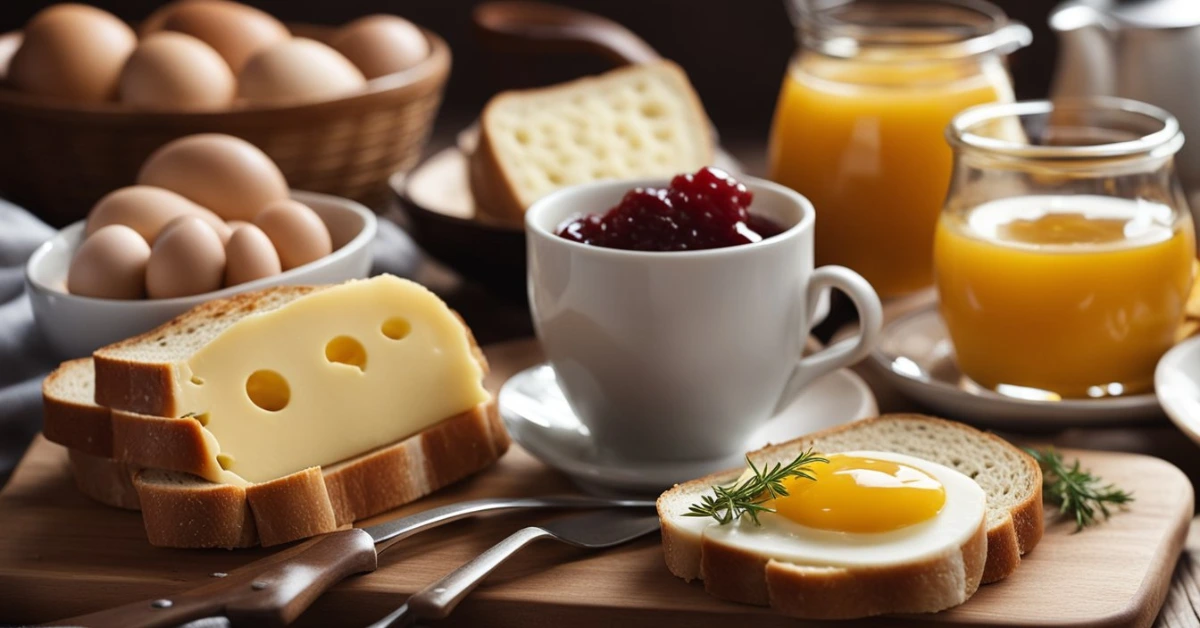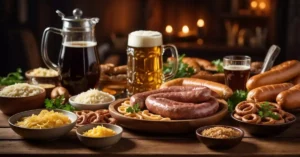Searching for a fulfilling and tasty meal to kick off your day? Look no further than the delights of German breakfast cuisine! German food is celebrated for its rich and gratifying meals, with breakfast being no exception. Whether it’s fresh bread rolls or savory meats and cheeses, there’s an abundance of choices to meet your morning hunger.
One of the most popular German breakfast items is fresh bread rolls, or “Brötchen”. These soft and fluffy rolls can be paired with a variety of toppings, including cheese, cured meats, and jams. If you’re in the mood for something sweet, try a warm pastry or a slice of apple strudel.
But German breakfast foods aren’t just about bread and pastries. You’ll also find a variety of savory dishes, such as scrambled eggs with bacon, potato pancakes, and smoked salmon. And if you’re feeling adventurous, why not try some traditional German dishes like Weisswurst or Leberwurst? No matter what your taste preferences are, there’s a German breakfast food that’s sure to satisfy.
What are German Breakfast foods?
If you’re planning a trip to Germany, you might be curious about what to expect for breakfast. German breakfast is typically a hearty meal, designed to keep you full and energized throughout the day.
At its core, a traditional German breakfast consists of fresh bread rolls, known as “Brötchen”, which can be paired with cheese, cured meats, and jams. Other popular items include soft boiled eggs, muesli topped with fruit, and a selection of warm pastries to satisfy your sweet cravings.
Germans take their bread seriously, and you’ll find a wide variety of breads and rolls available at bakeries and cafes. From dense, whole-grain loaves to light and fluffy rolls, there’s something for everyone.
In addition to bread, you’ll often find dairy products like yogurt, quark (a type of fresh cheese), and butter on the breakfast table. Cured meats like ham and salami are also common, as are hard boiled eggs and pickles.
Overall, German breakfast is a delicious and filling way to start your day. Whether you’re a fan of sweet or savory foods, you’re sure to find something to enjoy.
Key Components of a German Breakfast
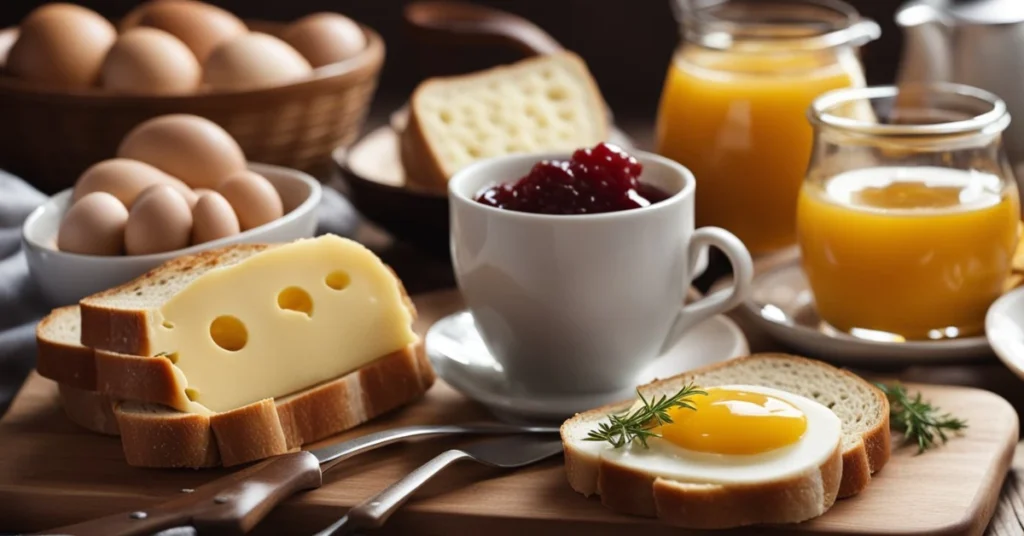
If you’re looking for a hearty breakfast that will keep you fueled throughout the day, look no further than a traditional German breakfast. German breakfast foods are known for their variety and freshness, with a focus on simple, high-quality ingredients.
Bread and Rolls
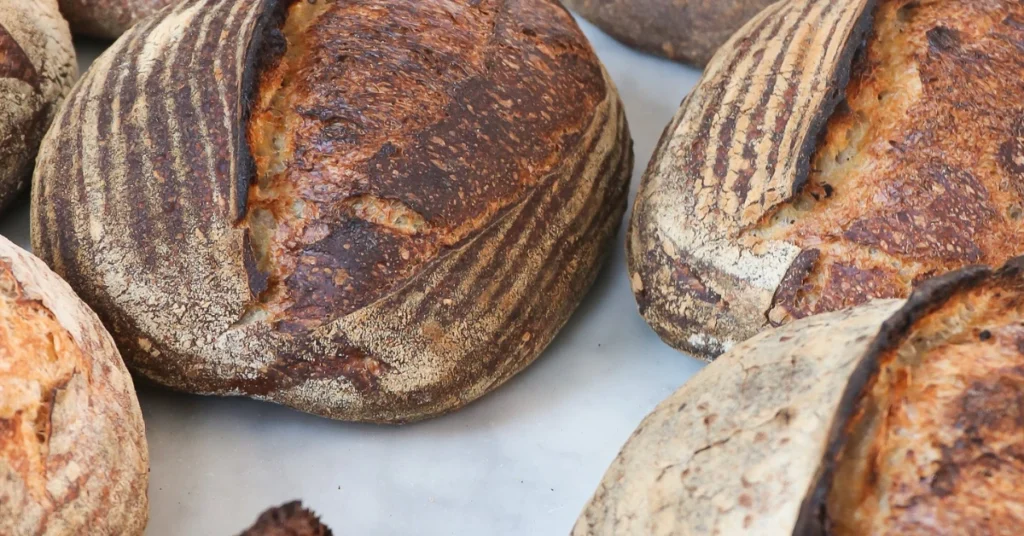
Bread and rolls are a staple of any German breakfast. Germans take their bread seriously, with a wide variety of breads available at bakeries and supermarkets. Darker, whole-grain sourdough bread and German rolls are common choices. Pretzels are also a popular option. Bread is often served with butter and honey or jam.
Cold Cuts

Cold cuts are a common addition to a German breakfast. Sausages, such as bratwurst and weisswurst, are popular choices. Ham and salami are also commonly served.
Cheese
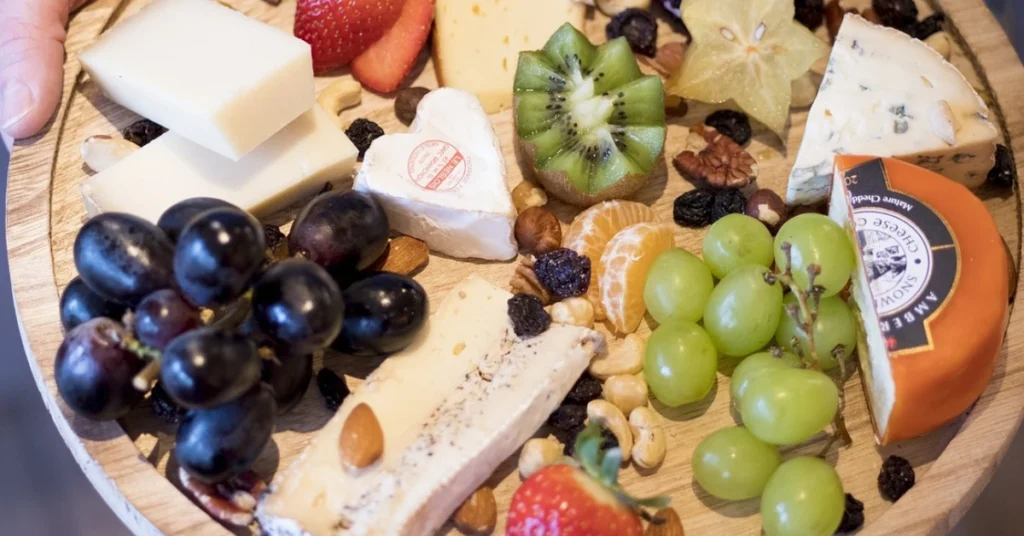
Cheese is another popular addition to a German breakfast. Soft cheeses, such as brie and camembert, are often served alongside harder cheeses like gouda and edam.
Jams and Spreads

Jams and spreads are a sweet addition to a German breakfast. Fruit jams, such as strawberry and raspberry, are popular choices. Nutella, a chocolate and hazelnut spread, is also a favorite.
In addition to these key components, a traditional German breakfast may also include soft boiled eggs, muesli topped with fruit, and warm pastries. With so many delicious options to choose from, it’s no wonder that German breakfast foods are a favorite among locals and visitors alike.
The Role of Coffee in German Breakfast

No German breakfast is complete without a cup of coffee. Germans are known for their love of coffee, and it is an integral part of their breakfast culture. Coffee is such an important part of breakfast that Germans have a special word for it: Frühstückskaffee, which translates to breakfast coffee.
Germans typically drink their coffee black, but it is not uncommon to add milk or cream. They also prefer their coffee strong and bold, with a rich and intense flavor. Germans take their coffee seriously and often invest in high-quality coffee beans and brewing equipment.
In addition to being a delicious beverage, coffee also has some health benefits. It is rich in antioxidants and can improve cognitive function and boost metabolism. However, it is important to consume coffee in moderation as excessive caffeine intake can have negative effects on health.
When it comes to pairing coffee with German breakfast foods, there are many options. Coffee goes well with sweet pastries like croissants and butterkuchen, but it also pairs well with savory dishes like eggs and bacon. Germans also enjoy dunking their bread in coffee, which is known as “coffee bread.”
In conclusion, coffee plays a vital role in German breakfast culture. It is a beloved beverage that is enjoyed by many and pairs well with a variety of breakfast foods. So, the next time you enjoy a German breakfast, don’t forget to savor a cup of delicious Frühstückskaffee.
Traditional German Breakfast Dishes
If you’re looking for a hearty and delicious breakfast, then traditional German breakfast dishes are definitely worth trying. Here are some of the most popular dishes that you can enjoy:
Butterbrot
Butterbrot is a simple yet tasty breakfast dish that consists of a slice of fresh bread topped with butter and a variety of toppings. Common toppings include cheese, cold cuts, jams, honey, and Nutella. Butterbrot is a great option if you’re in a hurry but still want a filling breakfast.
Muesli
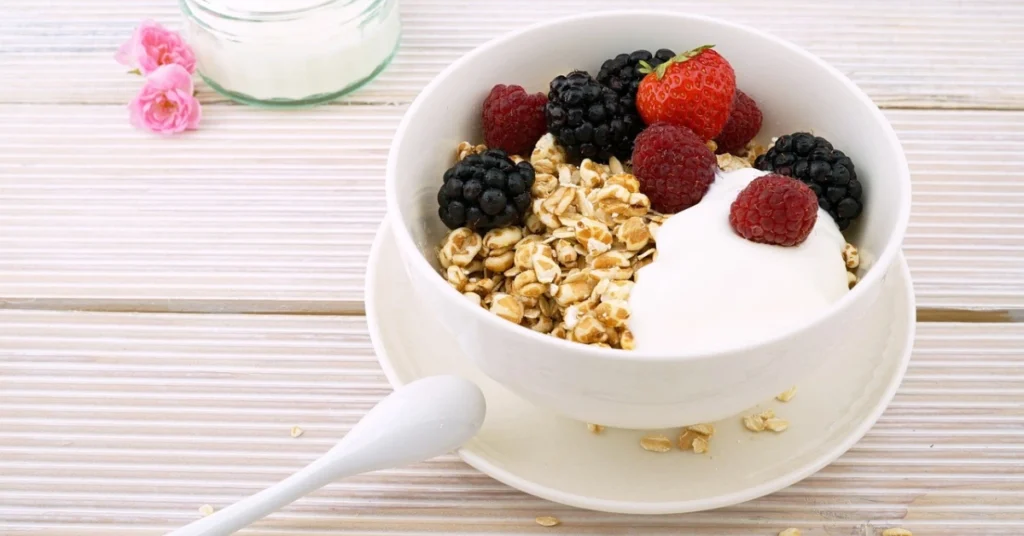
Muesli is a popular breakfast cereal that originated in Switzerland but is now enjoyed all over the world. It typically consists of rolled oats, nuts, dried fruit, and sometimes yogurt or milk. In Germany, muesli is often served with fresh fruit and yogurt or milk. It’s a healthy and delicious way to start your day.
Weisswurst

Weisswurst is a traditional Bavarian breakfast sausage that is made from veal and pork. It’s typically served with sweet mustard and a soft pretzel. Weisswurst is a great option if you’re looking for a more substantial breakfast that will keep you full until lunchtime. It’s also served as a snack during the daytime.
In addition to these dishes, you can also enjoy other traditional German breakfast foods such as soft-boiled eggs, cold cuts, and warm pastries. No matter what you choose, you’re sure to enjoy a delicious and satisfying breakfast that will fuel you for the day ahead.
Regional Variations of German Breakfast
German breakfast varies depending on the region you are in. Here are two popular regional variations of German breakfast:
Bavarian Breakfast
Bavarian breakfast is known for its hearty and filling dishes. It typically includes:
- Weisswurst: a white sausage made from veal and pork
- Brezen: a large, soft pretzel
- Obatzda: a spread made from Camembert cheese, butter, and paprika
- Leberwurst: a liver sausage
- Rye bread
- Mustard
Bavarian breakfast is perfect if you want a satisfying and savory breakfast that will keep you full for hours.
North German Breakfast
North German breakfast is lighter and more simple than Bavarian breakfast. It typically includes:
- Brötchen: a type of bread roll
- Butter
- Cheese
- Cold cuts such as ham or salami
- Jam or honey
- Boiled eggs
- Coffee or tea
North German breakfast is perfect if you want a quick and easy breakfast that still has plenty of flavor.
No matter where you are in Germany, you are sure to find a delicious breakfast that will start your day off right.
Modern Takes on German Breakfast
German breakfast has evolved over time, and modern variations have emerged that cater to different tastes and dietary preferences. Here are some modern takes on traditional German breakfast foods that you might want to try:
- Avocado toast with smoked salmon: This trendy breakfast dish has become a popular choice in Germany. It features a slice of whole-grain bread topped with mashed avocado, smoked salmon, and a sprinkle of salt and pepper. It’s a healthy and delicious way to start your day.
- Smoothie bowls: Smoothie bowls are a popular breakfast option in Germany, and they can be customized to suit your taste preferences. You can blend together your favorite fruits and veggies, such as bananas, strawberries, spinach, and kale, and top the smoothie bowl with nuts, seeds, and granola for added crunch.
- Vegan breakfast bowls: Vegan breakfast bowls are a great option for those who follow a plant-based diet. They typically include a base of grains, such as quinoa or brown rice, topped with roasted veggies, avocado, and a protein source like tofu or tempeh.
- Bircher muesli: Bircher muesli is a Swiss-German dish that has become popular in Germany. It’s a mixture of oats, nuts, seeds, and dried fruit soaked in milk or yogurt overnight, and it’s usually served with fresh fruit and honey.
- Egg muffins: Egg muffins are a quick and easy breakfast option that you can make ahead of time. They’re essentially mini frittatas baked in a muffin tin, and you can add in your favorite veggies, cheeses, and meats to customize them to your liking.
These modern takes on German breakfast are a great way to switch up your morning routine and try something new. Whether you prefer a sweet or savory breakfast, there’s something for everyone to enjoy.
The Cultural Significance of German Breakfast
German breakfast foods have a significant cultural importance in Germany. Breakfast is considered the most important meal of the day in Germany, and it is often a time for families to gather and share a meal.
Traditionally, German breakfasts are hearty and filling, with a focus on bread, cheese, and cold cuts. This is due to the country’s agricultural history, where farmers needed a substantial breakfast to sustain them through a long day of work.
In addition to the food itself, the way Germans eat breakfast is also significant. They often take their time to savor the meal and engage in conversation with family and friends. Breakfast is seen as a time to connect with loved ones and start the day off on a positive note.
Furthermore, German breakfast foods have also influenced cuisine around the world. For example, the German-style bread has become popular in many countries, and the concept of a hearty breakfast has been adopted in various cultures.
Overall, German breakfast foods are more than just a meal; they are a reflection of the country’s history, culture, and values.
Our Opinion
Start your day in Germany right away with a good and healthy Breakfast German Style. The German Breakfast foods are good to make it a good day. For us, it’s more than the question, of what we will eat. The Surroundings, come together, to start the day with your loved ones. All that matters minimum the same as the question, what do we eat?
So try the different tastes of German Breakfast foods and find the style, you like the most.
FAQ about German Breakfast Foods
What is a typical German breakfast?
A typical German breakfast includes bread rolls, cold cuts, cheese, boiled eggs, yogurt, muesli, and fruit.
What is a German pancake?
A German pancake is a baked pancake that is typically served for breakfast. It is made with eggs, flour, sugar, and milk and is often topped with powdered sugar and fruit. Typical for German Breakfast Foods.
What is a Berliner?
A Berliner is a type of pastry that is typically eaten for breakfast in Germany. It is a sweet doughnut-like pastry that is filled with jam or cream and is often dusted with powdered sugar.
If you liked this blog post about German breakfast foods, don’t forget to leave us a comment down below to tell us about your experience with it.

